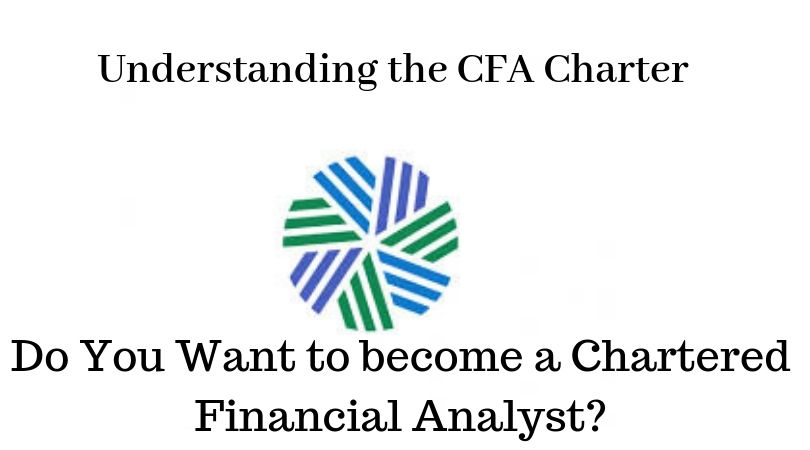Understanding the CFA Charter
- 25 May 2019 | 1489 Views | By Mint2Save

As we talk about careers in the financial sector, the options we can think of globally would include a Chartered Accountant or a CPA (Certified Public Accountant), a Merchant Banker, Equity or Risk Analyst, an Investment Banker, definitely Chartered Financial Analyst etc. A career in the financial sector is the most sought after and has a lot of competition too. In specifically diving into the intricacies of the Chartered Financial Analyst better known as CFA. The CFA charter equips you not only to enter the profession but also to excel at all stages of your career, let us understand the CFA Charter in detail.
Every year, thousands of young minds embark on the journey of one of the most mentally challenging experiences of their lives by taking the CFA exams. The CFA charter is one of the most sought-after distinctions that an individual can earn in the investment management profession. Becoming a CFA charter holder is an immense leg up for anyone thinking to build a career in the field of investment and portfolio management.
The institute providing the CFA degree is the CFA Institute, one of the premier global associations for investment management professionals. It is an organization that other than providing a CFA designation also offers a Certificate in Investment Performance Measurement (CIPM) designation and the Investment Foundations Certificate. It also stipulates regular education conferences, seminars, webcasts, and other publications to permit its members and other participants to stay updated on the current developments in the investment industry. CFA Institute also supervises the CFA Institute Research Challenge for university students and the Research Foundation of CFA Institute. Now let us understand how did this charter come into existence.
History
To get insights into the origins of the CFA designation and the program, we must first go back to 1942, the New York Society of Security Analysts (NYSSA), and a guy named Benjamin Graham. As those who learned economics will agree, ‘The Dean of Wall Street’, as he was called, was considered the first advocate of value investing. During the 1940s, Graham designed the idea of a certification process for financial analysts, which was then officially recommended and approved by the New York Society of Security Analysts. Exemplifying his thoughts in The Analyst’s Journal, published by the NYSSA in 1945, Graham summarized the benefits of such a certification and then put forth as the Qualified Security Analyst (QSA):
- An indication to investing clients the achievement of least requirements on knowledge and professional capability
- Additional reputation of the analyst; and
- The opportunity of increased financial return and employability
The first exam ever of the CFA was held on June 15, 1963, and over 300 analysts studied for and took the exam. As this was the first time, many of the candidates who appeared for this exam were actually seasoned pros – in fact, all who appeared for that particular exam were at least 45 years old – 33 of them were over 60 years of age and many had over 30+ years of experience as analysts!!
How to be a designated CFA charter holder?
Any aspirant who successfully completes the program and satisfies all other professional requirements as delineated by CFA Institute is awarded the “CFA charter” and thus becomes a “CFA charter holder”. Successful candidates almost take an average of four years to earn their CFA charter. Some of the basic requirements for entering in the CFA Program (with or without obtaining the charter) includes holding either a university degree or being in the final year of a university degree program (or equivalent as considered by the CFA Institute), or having four years of qualified, professional work experience in an investment decision-making process. To attain the CFA charter, an aspirant must have completed a university degree (or equivalent), additionally four years of qualified, professional work experience, in addition to passing the three exams that test the applicant’s knowledge of the academic portion of the CFA program.
Other requirements include having a valid international travel passport to register and sit for the exam. Another point to note here is that there are some countries that CFA Institute cannot work with, hence candidates residing in those specific countries like Cuba, North Korea, the Crimea region of Ukraine cannot appear for exams from these countries.
Candidates take one exam per year over three years, assuming a pass on the first attempt. The Level I exam is administered twice a year (usually on the first weekend of June and December) and the Level II and III exams are administered once a year, usually the first weekend of June. Each exam consists of two three-hour sessions. Level I has 240 independent, multiple-choice questions. Talking about the scoring pattern, there is no penalty for wrong answers on the multiple-choice/item set sections. Level II has 120 multiple-choice questions, organized as 20, six-question item sets, each set having its own essay of facts. To answer each question, the candidate must refer to the essay, as there is insufficient information in the question stem. Level III questions consist of a session of constructive response, essay-type questions, and a session of 10 six-question item sets as in the Level II exam.
Candidates who have completed the exam receive a score report that is intended to be fairly unspecific, as there is no overall score for the test, only a Pass/Fail result shows, and a range within which candidates performance for each topic area falls, which could be less than or equal to 50%, 51%-70%, and above 70%. According to statistics with the CFA Institute, fewer than 20% of candidates who begin the program receive the CFA Charter. More than 100,000 people around the world take the test in more than 100 countries every year.
Advantages of becoming a CFA charter holder
CFA Institute stands for creating an environment where investors’ interests come first, markets function at their best, and economies grow. Here are a few reasons why one should consider adding those three letters to their business card:
- Better Job prospects: Though nothing on the resume guarantees a job but having a CFA charter will boost one’s finance credentials. Earning the charter demonstrates your work ethic, analytical abilities, and ethical grounding to employers. Amongst the many employers of CFA’s include giants like PWC, JP Morgan, HSBC, Ernst & Young, Morgan Stanley, Citigroup etc.
- Global Recognition and Prestigious network: CFA Institute has a global network of over 135,000 investment professionals, it is recognized by regulators, universities, and certification programs in at least 30 countries and territories. It just opens the doors to the innumerable opportunities available globally.
- Affordable: While other programs including a post-graduation like an MBA can cost something over $100,000, on the contrary, the CFA charter would only cost between $2,400 and $12,000, depending on when you register, what study materials you buy, and how many exams you end up taking.
- Work while you study: One need not quit their job while pursuing this course, unlike some full-time MBA programs that eat on you full time. Though a little hectic, it is manageable to study for the CFA exam while you work. This creates a win-win situation as you can sponsor your own studies.
- Credibility and Industry Respect: CFA is known to be the most prestigious and valued qualification in the finance and investment industry. People widely understand and know the intense process that candidates need to go through before getting the charter. This makes it easier when stepping into the industry, as CFA charter holders gain instant recognition and respect, making it easier for them to take up interesting roles or positions. Quoting Financial Times on the credibility of attaining a CFA: “Among the countless finance degrees around the world, the Chartered Financial Analyst qualification has become the gold standard.”
Let’s look into some of the disadvantages too
- Time investment: One should be very confident that they want to achieve the designation before you commit. As this course requires a lot of sincere effort and dedication. It requires roughly 300 hours of preparation even before taking up the exam.
- Experience requirements: The CFA Charter requires a minimum of 48 months of experience before earning the charter. This is an additional requirement to be fulfilled to before you can become a certified charter holder.
Before enrolling yourself for CFA, make sure you make no mistake—earning the CFA designation is a grueling process, so before you commit, consider what it takes to earn it, how it will benefit you and your career, the negatives of going through the process, and whether the pros outweigh the cons.
The CFA Program is a universally acknowledged and accredited, graduate-level program, which fosters a robust foundation of the real-world investment analysis and portfolio management skills as well as the practical knowledge that an individual of this field needs. It also emphasizes the highest ethical and professional standards. Getting your CFA charter allows you to gain analytical skills and expertise in quantitative methods, economics, financial reporting, investments analysis, and portfolio management. This set of skills and knowledge you will develop, as you become a CFA charter holder will serve you well throughout your career.









